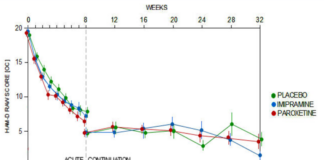Tag: SSRI
Nora: Extreme and Sudden Adverse Antidepressant Reactions
Nora tells us about the sudden and extreme adverse reactions that occurred immediately upon starting her antidepressant. She also tells us about the attitude of her doctors and how her life has changed since that short course of treatment.
Christopher: A Transformational Journey from Psychiatric Hospital To Working In Peer...
Christopher describes his transformational journey starting with a very difficult childhood which led him to be treated for many years with various psychiatric medications. After successfully withdrawing, he now works a Program Manager for Heart & Soul inc in California, an organisation which offers a variety of mental health recovery-oriented and wellness support opportunities.
SSRIs: Minimal Effectiveness and High Risk
If psychiatry were a bona fide medical field, a meta-analysis of this quality yielding these results would send Richter 9 shock waves through the profession. But the publication of this study on February 8 generated no discernible concern within the profession.
Most Off-Label Prescribing of Antidepressants Lacks Strong Scientific Evidence
A new study, published in the British Medical Journal, investigates the prevalence of off-label prescribing for antidepressant medication in primary care settings.
Giovanna: Withdrawing from SSRI Antidepressants After 23 Years
We talk to Giovanna from Australia who was prescribed an antidepressant aged 17 and tried many times to withdraw over the next 23 years. She shares her experiences with us including the advice and support that she received and her hopes for the future.
Claire: Antidepressant Withdrawal, Tapering and SSRI Discontinuation Syndrome
Claire shares her powerful story of being prescribed antidepressants at the age of 16 and her experiences of trying to withdraw., describing how she tapered gradually over 2 years, but went on to experience SSRI discontinuation syndrome
New Data Show Lack of Efficacy for Antidepressants
An article published this month in the journal BMC Psychiatry suggests that there is a lack of efficacy for SSRIs and that they significantly increase the risk of serious side effects.
What’s the Harm in Taking an Antidepressant?
We know that all drugs have side effects. That’s just part of the deal right? But is it really possible that an antidepressant can cause a sane person to act like a cold-blooded criminal?
When Psychiatric Medications Cause Psychiatric Symptoms
Dr. Yolande Lucire, a psychiatrist from Australia, recently published a paper about the iatrogenic effects of psychiatric drugs.
What Animal Research Says About Sexual Side-effects of SSRIs
A group of researchers in Denmark examines what existing animal studies can tell us about the sexual side-effects of SSRI antidepressants.
Study 329 Taper Phase
Most doctors still affect surprise at the idea SSRIs might come with withdrawal problems. Regulators knew very clearly since 2002 about the problems, but have decided to leave any communication of these issues in company hands.
Study 329 Continuation Phase
All the fuss about Study 329 centers on its 8-week acute phase. But this study had a 24-week Continuation Phase that has never been published. Until Now.
Sadness: The Problem and The Solution
There is an ever-narrowing bandwidth of behavior that supports the dominant narrative in our culture today. We all need to act a certain way to protect the foundational beliefs of our time – that “science” has it all figured out, that rules keep us safe, and that it’s us vs. them (insert germs, terrorists, pests, and other “enemies”). But what are the consequences of this? What is this sadness and where does it go if we bandage our consciousness with business, medication, substances, or general avoidance of our real human experience?
Violence Caused by Antidepressants: An Update after Munich
The media is now reporting details about the 18-year-old who shot and killed nine and wounded many others before killing himself on July 22 in Munich. My clinical and forensic experience leads to a distinction among people who murder under the influence of psychiatric drugs. Those who kill only one or two people, or close family members, often have little or no history of mental disturbance and violent tendencies. The drug itself seems like the sole cause of the violent outburst. On the other hand, most of those who commit mass violence while taking psychiatric drugs often have a long history of mental disturbance and sometimes violence. For these people, the mental health system seems to have provoked increasing violence without recognizing the danger.
Rising Rates of Suicide: Are Pills the Problem?
If you’ve read recent reports that state “US suicide rates surge to a 30 year high,” you might first justify the reality with the fact that things feel very wrong in our world today. On a personal, national, and planetary level, people are suffering to survive and the distress is coming from all sides – medical to economic to existential. But you probably also wonder why more people are choosing this permanent and self-destructive path, and feel compelled to submit to seemingly logical appeals to provide these individuals more help and greater access to treatment. Surprise: that may be the last thing our population of hopeless and helpless needs. Life’s inevitable challenges are not the problem. It’s the drugs we use that are fueling suicide.
Moving Forward in the Science of Psychiatric Medication Discontinuation/Reduction
This week Live & Learn launched a research study on the experience of people labeled with mental disorders who have tried to stop taking psychiatric medications. This project -- the Psychiatric Medication Discontinuation/Reduction (PMDR) Study -- aims to understand the process of coming off psychiatric medications in order to better support those who choose to do so. The study seeks to answer the question: What helps people stop their psychiatric medications? What gets in the way of stopping?
Who Will Guard the Guardians of Psychiatry?
The assertion that the so-called antidepressants are being over-prescribed implies that there is a correct and appropriate level of prescribing and that depression is a chronic illness (just like diabetes). It has been an integral part of psychiatry's message that although depression might have been triggered by an external event, it is essentially an illness residing within the person's neurochemistry. The issue is not whether people should or shouldn't take pills. The issue is psychiatry pushing these dangerous serotonin-disruptive chemicals on people, under the pretense that they have an illness.
A Worldwide Epidemic – The Misuse of Anti-Depressant Medications
Not all people who have letters after their names are actually "gods" or even people who have any special powers to know things about us more than we can learn about ourselves, about our own bodies, and our own minds. Blindly following what someone says we need to be doing for our own health (mental or physical) and well-being just because they have a white jacket on (so to speak) is usually not in our best interests.
Restoring Study 329: Letter to BMJ
When we set out to restore GSK’s misreported Study 329 of paroxetine for adolescent depression under the RIAT initiative, we had no idea of the magnitude of the task we were undertaking. After almost a year, we were relieved to finally complete a draft and submit it to the BMJ, who had earlier indicated an interest in publishing our restoration. But that was the beginning of another year of peer review that we believed went beyond enhancing our paper and became rather an interrogation of our honesty and integrity. Frankly, we were offended that our work was subject to such checks when papers submitted by pharmaceutical companies with fraud convictions are not.
“You May Be On Prozac But Not Know It”
"Within the last decade," reports The Alternative Daily, "traces of pharmaceuticals have been reported in the water cycle, including surface waters, wastewater, groundwater and to...
“Is It Her Hormones?” A Case of Psychiatry Missing the Mark
The case of “Beth” depicts, almost innocently, the trials and tribulations of a well-adjusted, talented 15-year-old who developed depression, paranoia, panic attacks, and self-injurious and homicidal behavior, and “bipolar disorder” after being prescribed antidepressants, and then antipsychotics. After Beth decided - on her own - to discontinue psychotropic medications in favor of hormone therapy, she remained free of psychiatric symptoms.
Smashing the Neurotransmitter Myth: How & Why Antidepressants Cause Suicides &...
Let us put the final nail in the coffin of the neurotransmitter myth of big Pharma and the APA. The idea that psychiatric issues come from some quantitative soup of neurotransmitters in the synapses of the brain is completely wrong. Yes there are neurotransmitters in the brain. However, serotonin does not create symptoms.
Serotonin Is Still Alive and Well in Psychiatry Land
In the September, 2015 issue of JAMA Psychiatry, a team of Swedish researchers published a study evaluating the serotonin system in persons with social anxiety. the findings here are in direct contradiction to what the pharmaceutical companies would have us believe: that anxiety and depression are caused by deficit levels of serotonin. There was an editorial by the authors in the same issue which attempted to obfuscate the findings by referencing the heterogeneity in persons who exhibit social anxiety. Unfortunately, neither the article or the editorial referenced the work of neuroscientist who for the past 30 years have been investigating what happens in the brains of animals that are subjected to uncontrollable stress.
SSRIs and Benzodiazepines Associated with Problems in Infants
Infants exposed to SSRIs and benzodiazepines during pregnancy show impaired neurologic functioning in the first month after birth, according to a new study published in the American Journal of Psychiatry. While infants exposed SSRIs alone showed neurobehavioral effects throughout the first month, those exposed to an SSRI and a benzodiazepine had more significant problems.
Study 329: Transparency in Limbo at the British Medical Journal
While making money from the publication of pharmaceutical company trials, and in the face of a complete failure by industry to adhere to basic scientific norms and make data available, BMJ and other journals — although BMJ in particular — have run a series of articles on supposed Academic Fraud. These articles feature instances of fraud sometimes as bizarre as researcher claiming he cannot show the data as it was eaten by termites. The universal feature is that these are academic studies, and academic fraud is an issue in academia.




















